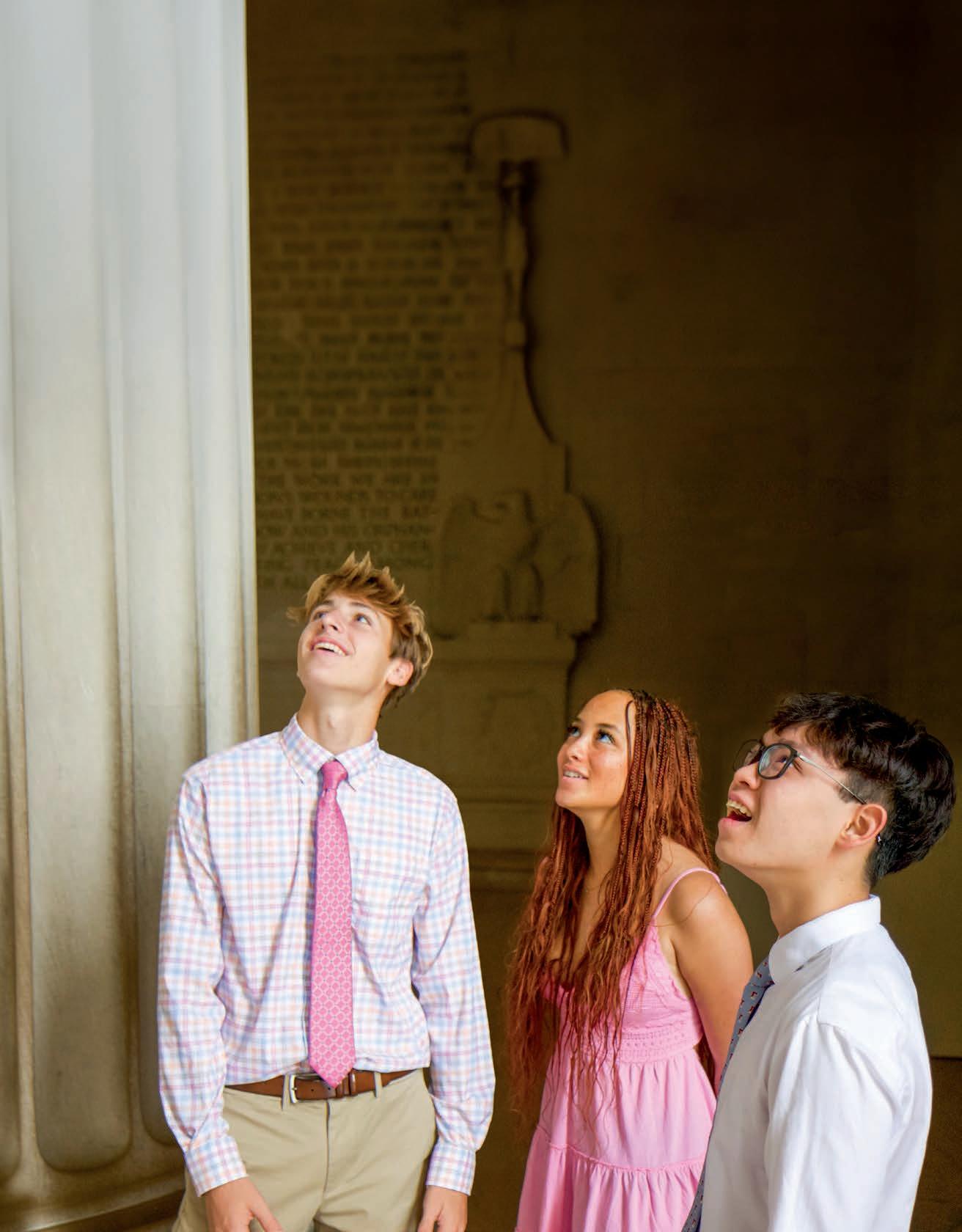
5 minute read
Inside The McCain-Ravenel Center
WHERE WE BEGAN
IN 1970, DAVID KELSO ’70, PRESIDENT OF THE STUDENT CURRICULUM COMMITTEE, CONCEIVED OF THE IDEA FOR THE MAY PROGRAM, WHERE SENIORS SPEND THEIR LAST MONTH ON THE HOLY HILL IMMERSED IN EXTERNSHIPS RATHER THAN IN THE CLASSROOM.
In Kelso’s words, “Getting out in the ‘real world’ before a relatively unfettered college experience seemed like a good idea.”
Twelve seniors, including Kelso, were the inaugural class of externs. Their work included an array of experiences from Capitol Hill to Children’s Hospital to a social services organization helping underserved children and more.
Kelso, his classmates, and the administration knew then the importance of leveraging the vast resources of Washington, D.C. What Kelso and his classmates could not have known at the time is what they had started. The May Program, still going strong more than 50 years later with the entire senior class participating, was the origin of the Washington Program, which engages the entire student body and is an integral piece of the McCain-Ravenel Center for Intellectual and Moral Courage.

WHERE WE ARE NOW
ESTABLISHED IN 2018, THE M c CAIN-RAVENEL CENTER FOR INTELLECTUAL AND MORAL COURAGE COORDINATES AND SUPPORTS SIGNATURE INITIATIVES AT EPISCOPAL, WHICH FOCUS ON EXPERIENTIAL LEARNING, EXTERNSHIPS, GLOBAL PROGRAMS, ETHICAL LEADERSHIP, OUTDOOR EDUCATION, SERVICE LEARNING, AND CIVIC ENGAGEMENT.
The Center helps faculty and staff connect students with the resources of Washington and design programs that advance the mission of the School: to prepare young adults with intellectual and moral courage. The Center’s goal is to ready students for life outside Episcopal and to help them embody the Portrait of a Graduate. It is named for the late Sen. John McCain ’54 and his EHS mentor, teacher William B. Ravenel, a World War II veteran who inspired McCain to pursue a life of honor and service. The senator once said: “Mr. Ravenel changed my life. He gave me some moorings and a compass. He used his classroom as not only a way to teach English but also to teach values and standards and morals.”

Q: WHAT ARE SOME OF THE GOALS THE MRC FACULTY PURSUE IN BRINGING SPEAKERS TO CAMPUS?
A: We look for a number of things. Most importantly, we hope that speakers are deeply engaging and are excited to connect with high school students. We hope that they model the best aspects of civil discourse. We also hope that speakers bring a wide range of ideas for our students to consider. We never ask our students to agree with what they hear; we want to provide them with an opportunity to hear things that make them consider ideas or perspectives they may not have previously considered. This process allows students to become more self reflective as they examine their beliefs and experiences while also considering the experiences of others. That examination allows students to mature and grow as they learn to relate to people in new and different ways.
Q: WHAT DO YOU THINK THE FUTURE HOLDS FOR THE M c CAIN-RAVENEL CENTER?
A: Our hope for the future of the MRC is to become even more integrated and engaged in all aspects of campus life. We plan to develop grade-level classes that are structured to take special advantage of our location and ensure that all students have shared experiences, creating opportunities for bonding and class camaraderie. The grade-level classes would be deeply connected to both MRC programming and departmental class offerings. We also plan to build a leadership program, organizing the opportunities provided to students both in and out of the classroom. The focus of the program will be to help students become more self reflective and intentional as they connect classroom work to extracurricular activities to opportunities for engagement with think tanks, NGOs, policy makers, and non-profit organizations that make D.C. such a rich and vibrant area.
MOUNT VERNON
Dr. Charlotte Taylor Fryar’s Advanced American Studies visited Mount Vernon to contemplate how well the place tells the story of the many lives of George Washington: a revered founding father, a military hero, a land surveyor, a politician, a husband, and a man who owned enslaved people. The trip organically coincided with their summer reading book: “Never Caught: The Washingtons’ Relentless Pursuit of Their Runaway Slave, Ona Judge” by Erica Armstrong Dunbar. Advanced American Studies covers two separate class blocks, meaning the class had more time to explore and consider their assignment — something Fryar does not take for granted when lesson planning. “Having the double block has been revolutionary,” she said. Read more about the recently revamped course on page 43.








